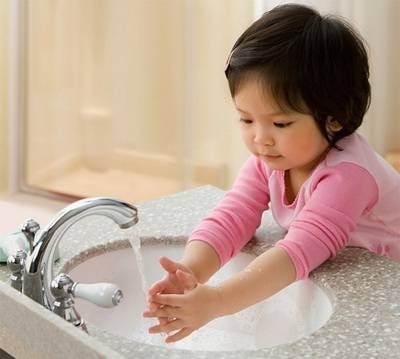Cold season to prevent diarrhea caused by Rotavirus
Acute diarrhea caused by Rotavirus or winter diarrhea is an acute gastrointestinal infection caused by rotavirus. The disease is common in young children, especially those aged 3-24 months. This is a common disease, but what is worrying is that parents treat it incorrectly, ignore it, or mistake winter diarrhea for other diseases such as fever, teething, or nighttime colds..., resulting in many children becoming severely dehydrated.
Symptoms of the disease
After 1-4 days of being infected with the virus, the child will show symptoms of the disease. With this disease, the child will usually vomit first, then after about 1-2 days, they will start to have diarrhea, some children will have diarrhea and then vomit. Children with diarrhea will be better if they do not vomit than those with both diarrhea and vomiting. Moreover, the vomiting phenomenon is very unexpected, the child is playing and eating normally but after only half a day, this phenomenon can occur, whatever they eat is vomited.
| Vaccination is the most effective way to prevent diarrhea caused by Rotavirus. |
Children often have bowel movements many times a day (green or white stools mixed with mucus, sometimes like the color of lavender or mustard flowers), stools are often watery.
In addition, children may have cough, fever, runny nose, so many parents easily mistake it for respiratory tract infection or rhinopharyngitis.
Children with diarrhea caused by Rotavirus, if not detected and treated promptly, will quickly become exhausted due to dehydration and salt loss, easily leading to circulatory collapse and death. Therefore, parents should not be subjective when seeing signs of dehydration in children such as: dry lips, dry tongue, dry skin, little urine, irritation, crying.
Caring for children with acute diarrhea at home
For children with mild dehydration, families can completely take care of their children at home to prevent dehydration and malnutrition, including ensuring that children drink more fluids than usual to prevent dehydration such as: ORS, salted rice water, salted rice water, fruit soup or chicken soup, meat soup, clean water. The best is to rehydrate, replenish electrolytes, preferably ORS. There are many types on the market for children with very easy-to-drink flavors. It is important to note that it is mixed with water according to regulations, not too diluted or too concentrated because otherwise it will cause more water and electrolyte disorders, the diarrhea will be more severe, and the child may die.
Parents should feed their children spoonfuls of ORS every 2 minutes, not continuously. Because of drinking too much and continuously, ORS not only will not be absorbed into the intestines but more water may be lost due to vomiting. If the child vomits, stop for 10 minutes, then give the child another drink at a slower rate.
 |
| Keeping your hands clean is the basic measure to prevent diarrhea. |
If you do not give your child enough water and electrolytes, it will not be effective, or if you give your child too salty rice porridge or sugary fruit juice. Some parents even give their children coke, soda and other carbonated drinks that are prohibited for children with diarrhea, making their illness worse.
Continue feeding your child to prevent malnutrition: Most children with watery diarrhea will regain their appetite when they are rehydrated. Therefore, during this period, your child's daily diet should be continued and gradually increased. Feeding your child enough nutrients will help your child's body recover quickly, regain weight and intestinal function. However, avoid raw vegetables, tubers, and high-fiber grains because they are difficult to digest. For children who are exclusively breastfed, you need to breastfeed more often and for longer after each feeding. If your child is not exclusively breastfed, give him or her one or more of the solutions mentioned above. Absolutely avoid giving your child sugary drinks, sweet tea, or industrially produced fruit juices because these solutions can make diarrhea worse.
When is an IV needed?
Children with diarrhea, vomiting but drinking ORS, eating, playing normally... parents do not necessarily need to have IV fluids. If the child has diarrhea, vomits a lot, is tired, does not eat or drink, does not play, lies lethargically, has signs of dehydration such as sunken eyes, wrinkled skin, parents need to take the child to the hospital for timely IV fluids.
Note, when children have diarrhea caused by viruses, parents absolutely must not give their children antibiotics or anti-diarrheal drugs because it will put the child at risk of gastrointestinal bacterial disorders, reduce intestinal motility, making the disease worse or causing prolonged diarrhea, not to mention the side effects caused by the drugs.
Preventable disease
Acute diarrhea caused by Rotavirus spreads very quickly, so if a child is sick, he or she should stay home from school until the diarrhea is gone to avoid spreading it to other children. Currently, the most effective method of disease prevention is to give the child the vaccine. Children are given 2 doses 1 month apart, starting from the 6th week after birth (the oldest age that can still receive the Rotavirus vaccine is 3 months old, the age to stop receiving the vaccine is 4 months old). After the first vaccination, it is necessary to monitor the child for any allergic or unusual symptoms and notify the doctor immediately.
In addition, keeping hands clean is a basic measure to prevent disease. Children should be trained to wash their hands before handling food, before eating, and after using the toilet. Caregivers must wash their hands with soap after changing diapers or cleaning the child.
Do not let children crawl on the floor or suck their hands or toys. Clean the floor, objects, tables, chairs, and toys with Cloramin B disinfectant solution. Clean the bathroom floor and toilet after children have diarrhea.
According to SKDS
| RELATED NEWS |
|---|

